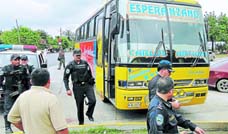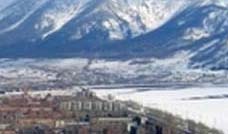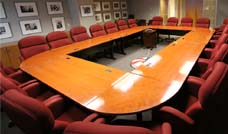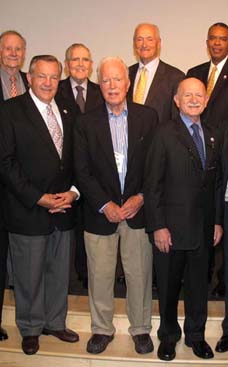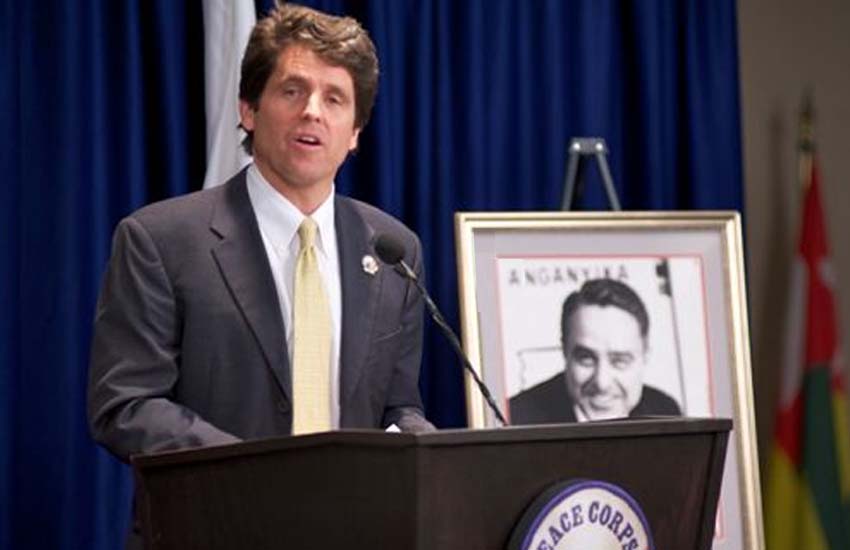
Mark Shriver spoke at Peace Corps headquarters on January 19, 2012 to pay tribute to his father Sargent Shriver, founding director of the Peace Corps, and to speak truth to power about Obama's unfulfilled promises to the Peace Corps and the timid policies of this Peace Corps administration.
"I know that if my dad were here today, physically - because I feel him here spiritually - if he were here physically he would be agitating us all to think ahead, to the next 50 years. He would challenge everyone in this room - from Director Williams to Donald Dell to the newest employee here - each one of us to do more for peace. He'd ask us if we really believe in peace, why do we as a country spend less on the Peace Corps than we do on the marching band of the Army? He would ask why we spend more in five hours in Iraq than we do on supporting the 8,700 Volunteers around the world for an entire year. And he would - as he did to President Kennedy and Johnson and every leader he met - speak truth to power: he would know that during the 2008 election, President Obama campaigned on doubling the size of the Peace Corps. That is not even close to happening - indeed, there is a long waiting list of 20 new countries requesting Peace Corps programs. Do we really mean to have peace? If so, why isn't it beginning here, in the United States? Or are we just supporting the rhetoric and spending the money elsewhere? Now these challenges, especially in tough economic times, might seem overwhelming, if not impossible, to overcome. Right? I mean, the President has so many other things on his mind, right? And they are all more important than the Peace Corps, correct? Come on, now!"
Mark Shriver Speaks Truth to Power at Peace Corps Headquarters
Mark Shriver Speaks Truth to Power
Mark Shriver Speaks at Peace Corps Headquarters. All Photos: US Peace Corps with special thanks to Kristina Edmunson in the Peace Corps Press Office.
When my father died, my siblings asked me to give the eulogy at his funeral. At the time, I didn't really want to be drafted into that role, but I was, and it has turned out to be a blessing for me.
Because before I wrote that eulogy, I thought I knew my father. Of course I did know him - as any son knows his father. But as I was preparing the eulogy, I began to get to know him as a man in his own terms - not just as a father in relation to me. And what I learned was such a revelation to me that I have spent the last 12 months in a quest to understand him even better. So in my remarks today, I will share with you some of the things I have learned about him and from him over these past few months; he continues to lead and teach me, and I think he can teach us all one or two things tonight.
When President Kennedy called Dad 50 years ago, the Peace Corps was a new idea.
Nothing like it had ever been tried by the U.S. government, and in 1961 the very notion of launching the Peace Corps triggered tremendous enthusiasm. A Harris poll taken just prior to President Kennedy's inauguration showed that 71% of Americans favored the creation of the Peace Corps, but there were very serious obstacles to its creation. First of all, it was an idea and really only an idea - no one had fleshed it out beyond a few campaign conversations.
Not only was it just an idea, but there was no funding for the project and existing foreign aid agencies also posed significant opposition. If it was going to be created at all, existing departments did not want it to be independent. They wanted it within the existing bureaucracy, which Dad was vehemently opposed to.
The odds of making the idea a reality were stacked against Dad. Former President Eisenhower mockingly dubbed the Peace Corps a "juvenile experiment," and in an editorial entitled "It's a puzzlement," the Wall Street Journal wrote: "The thing is so completely disproportionate as to be nonsensical. The wars of the civilized world did not break out because there was any lack of peoples-to-peoples contact between Germans and Frenchmen . . .. What person - except perhaps the very young themselves - can really believe than an Africa aflame with violence will have its fires quenched because some Harvard boy or Vassar girl lives in a mud hut and speaks Swahili?"
Some who were supportive of the idea suggested that it start out as a small pilot program.
And foreign governments accused the effort of being a vehicle for American infiltration (read: spying) of their cultures. And as you saw, Dad even joked publicly that he was given the job because Jack told him that if it failed, it would be easier "to fire a relative than a political friend."
Yet Dad, through grueling months of strategic lobbying, cajoling, hell-raising, and insisting, almost single-handedly turned a wobbly idea into what I believe is the most enduring legacy of the Kennedy Administration. He appeared on Meet the Press to lobby the nation; he went to the Hill almost every other day to lobby congressmen; and he traveled the country encouraging and being encouraged by all the young people who wanted him to deliver on the President's promise.
As for a pilot program? Dad thought that approach would ruin the Peace Corps. The result? In June 1961, there were no - zero - Volunteers in the field, but by December, there were 900 in 13 countries.
In the five decades since its creation, the Peace Corps has gradually become a fixture of our political and cultural landscape. Over 200,000 Volunteers have served overseas. Some 9,000 are serving now, including my nephew, Teddy Shriver, who today is serving in Peru.
Understandably, most of us are now no longer as spontaneously curious as we were in 1961 about what Peace Corps is; what it does; how it works. So it is now easy to underestimate the distinctive approach to peacemaking that Dad and his staff built into the policies and procedures of the program, and to overlook the fact that "Peace Corps" was my father's tough-minded, practical answer to a question that I think is just as pressing for us today as it was when he asked it in 1961: "If you believe that people must live in harmony in this conflict-ridden world, how is this going to come about?" My father took this question very seriously, and his answer was: the Peace Corps.
In fact, in the lobby of the original Peace Corps offices in Washington DC, Dad hung a sign with words in six-inch silver letters:
"If they mean to have peace, let it begin here."
Now, these words speak for themselves, but Dad's sign was also a play on words, a reference to a famous quotation that would certainly resonate with history buffs of the Revolutionary War and school children in Massachusetts. For there is a monument on Lexington Green in Lexington, Massachusetts, dedicated to the first battle of the Revolutionary War - a monument that also memorializes the words that Captain John Parker spoke to the Minutemen he commanded that day, just before the first shots in the first battle were fired: "If they mean to have war, let it begin here."
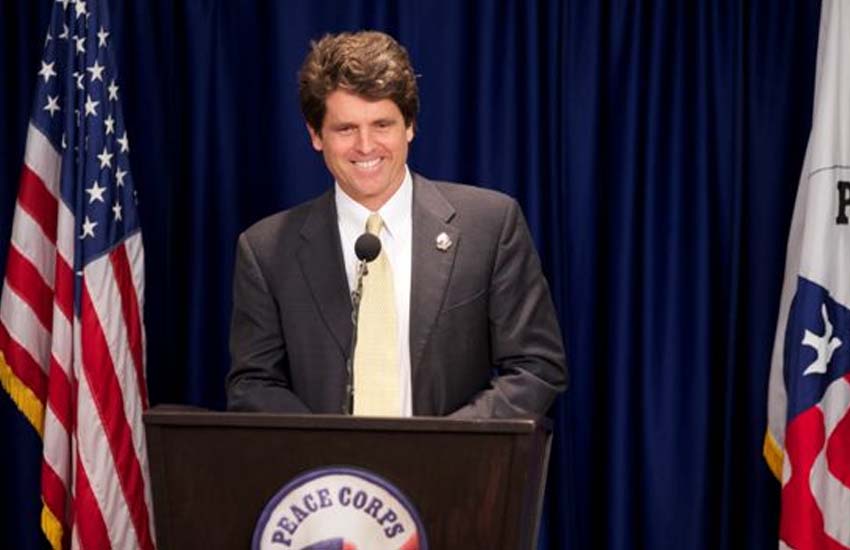
In Dad's mind, the Peace Corps was the beginning of a Revolution - a revolution for peace. "If they mean to have peace, let it begin here." But what kind of revolution did Sargent Shriver think he was starting? "The Peace Corps is different," Dad told the Foreign Policy Association in December 1963. "It goes beyond politics and national rivalries to reach the deepest hopes of man. It is a working model, a microcosm, a small society representing the kind of world we want our children to live in."
But what is the driving force of this revolution? What takes us beyond violence, beyond politics and national rivalries, to realize our deepest hopes for the kind of world we want our children to live in? In a speech at Fordham University, Dad stated the foundational principle of his revolution: "Compassion and service," he said, "shatter barriers of politics and creed; [they] dissolve obstacles of race and belief anywhere in the world."
Dad built these revolutionary ideals into the policies that guided the work of Peace Corps Volunteers in the field. As he explained to the Foreign Policy Association:
Our Volunteers [do not] go overseas as the salesmen of a particular political theory, or economic system, or religious creed. They go to work with people, not to employ them, use them or advise them. They do what the country they go to wants them to do, not what we think is best.
They live among the people, sharing their homes, eating their food, talking their language, living under their laws, not in special compounds with special privileges.
"Compassion is the ideal," he maintained in a speech at the World's Fair in 1964, "that must illuminate, from the very center, all our efforts to bring a better life to our world, within our own country, and in the farthest reaches of the planet." As he went on to say: "it is only with this compassion that man can look upon man - through the mask of many colors, through the vestments of many religions, through the dust of poverty, or through the disfigurement of disease - and recognize his brother."
To get a better sense of what my father was getting at, let's consider for a moment the story of Dave Meyercord. Dave served in the Dominican Republic and accomplished some amazing things as a Peace Corps Volunteer: He built his own house by hand. He helped to build an aqueduct, so that the village women no longer had to walk miles each day to carry water. He helped to build two schools. He was instrumental in clearing a road to the village, which before had to be reached by donkey on a mountain trail.
In fact, most Peace Corps Volunteers have stories comparable to Dave's and as a result we tend to identify Peace Corps service - and the point of engaging in such service, with the good that it does - with its external results. But you know what? My father took that for granted. He knew Peace Corps Volunteers could do good things for people.
Fifty years ago - when he was working with his staff to hammer out the policies and procedures for Peace Corps - when he was launching his peace making revolution - he was concerned with a prior set of practical questions. What would it take for villagers like those in the Dominican Republic to welcome a Peace Corps Volunteer like Dave Meyercord into their community in the first place? What it would take for them to want to engage with him - to help him build his house - to listen to his ideas about aqueducts and schools and roads? How could Peace Corps position the Dave Meyercords of the world to cross the barriers of race, culture, politics, and belief that would ordinarily divide them from the people they wanted to serve?
In a speech he delivered to the Commonwealth Club of California in October 1963, my father set forth what he referred to as the "five simple rules" for making peace as a Peace Corps Volunteer:
First, learn the language of the people with whom you work.
Second, make up your mind that the work of developing nations is worth the price of personal sacrifice.
Third, anchor yourself in the customs and traditions of the country where you are serving.
Fourth, take your standard of living down near enough to the local level to make it possible to mix freely and easily with the people.
Fifth, believe in the power of personal integrity, humility and determination.
I find these five rules to be both elegantly and deceptively simple. To grasp their inner logic, try to position yourself imaginatively as a villager in the Dominican Republic, or in Mali, or Peru. What would it take for us to engage with a Peace Corps Volunteer, to get to know her, to trust her, to work effectively with her?
First, at a minimum, she would need to speak our language. Without a common language, it would be impossible for us to work effectively together at all. Rule One: "learn the language of the people with whom you work."
Third, as important as it would be for her to speak our language, this alone would not ensure that we could establish a meaningful, collaborative relationship with her. She would also need to learn the basic rhythms and patterns of our culture. If she does not understand our ways of communicating, relating, and connecting, we simply would not be able to engage meaningfully with her, nor she with us. Rule Three: "anchor yourself in the customs and traditions of the country where you are serving."
Fourth, she would also have to live among us. Without a common set of experiences, interests, and concerns, there would be no occasion for us to have a conversation and no reason for us to connect with each other, even if we happened to speak the same language or share a cultural frame of reference. If she lived with the ex-pat community in a compound, what chances for meaningful contact would we have? How would we talk with her, get to know her, work with her, or learn to trust her? Rule Four: "take your standard of living down near enough to the local level to make it possible to mix freely and easily with the people."
In this connection, it is important to highlight what has been explicit all along: that the Volunteer's effort to make peace takes place on the home field of the host-country national, in terms of their language, their culture, their way of life. It takes but a moment's reflection to grasp the degree of difficulty involved in the Volunteers' decision to cross over to a different culture to make peace in the spirit of service. It is the Volunteer who takes on the primary burden of understanding and of making oneself understood. As my father put it, "For the Volunteer to succeed, the Peace Corps could not be just another job. The Peace Corps Volunteer had to share the impatience, the anxiety of the people. And for him to succeed, he needed to know as much about how to work with the poor as he did about how to make corn grow."
At base, this calls for a generosity of spirit that Dad forthrightly associates with compassion and personal sacrifice: "Our objective [is not] discomfort for discomfort's sake, but rather a willingness to share the life of another people, to accept sacrifice when sacrifice is necessary."
There is a personal cost to such compassion: the pain that comes from making oneself vulnerable to the projections of misunderstanding and ulterior motives in the process of making peace. Rule Two: "make up your mind that the work of developing nations is worth the price of personal sacrifice."
Finally, for this peacemaking strategy to work, the Volunteer has to deliver on it. A Volunteer has to be genuinely motivated by the spirit of service to human welfare and human dignity, not some other political or personal purpose. As my father explained in an article in Foreign Affairs: "Peace Corps Volunteers are not trained diplomats; they are not propagandists. They represent our society by what they are, what they do, and the spirit in which they do it." Rule Five: "believe in the power of personal integrity, humility and determination."
But do these five rules actually make peace? Is this rhetoric . . . or revolution?
In reading through my father's speeches, I was astonished to learn not only that these five rules were put dramatically to the test time and again in the early years of Peace Corps, but also that my father stood by them.
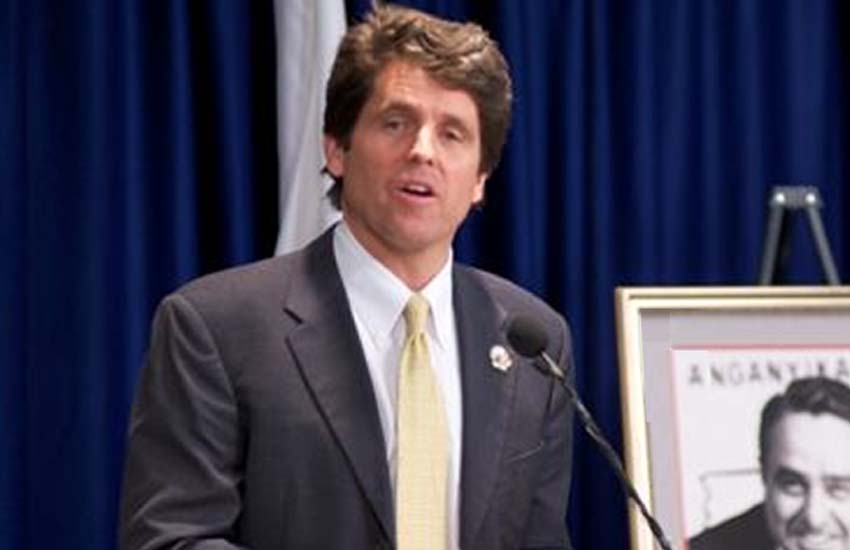
In 1964 in Panama, violent, anti-American, anti-colonialist riots erupted in the country and mobs of angry Panamanians went looking for their North American oppressors. As Director of the Peace Corps, my father had a decision to make. What was he going to do about the scores of Peace Corps Volunteers serving in the country? Officials in the State Department urged him to evacuate the Volunteers, to pull the Volunteers back into the safety of the Canal Zone. What do you think would you have done? Follow the State Department's advice or leave a bunch of young Volunteers out in the field by themselves to fend for themselves? My father rejected the advice of the State Department. He described this incident as well as his decision in a speech to the National Conference on Poverty in the Southwest, in Tucson, Arizona in early 1965, "We decided to stick it out!" he said. "We dispatched orders to every Volunteer: Stay put. Don't leave your villages." Why? As he explained: "We had gone to Panama for one purpose - to work - to work for and with the Panamanians."
"Then," he went on to say, "we held our breath - and sweated! For three days, we heard nothing."
Remember, 1964 was before the era of instant communication - before the Internet, before cell phones, before You-tube, before Skype. For three days, he had no idea what was happening to his Volunteers, or what the dire consequences of his decision might be.
In the face of a violent uprising, my father decided to trust that the policies and procedures he had built into the Peace Corps had enabled the Volunteers to make peace, to form human connections - real relationships with the Panamanians they served. As he said earlier: "deeds of compassion and service dissolve barriers of politics and creed anywhere in the world."
But of course, there are no guarantees. We know that, and he knew it too. That's why he was sweating it out!
"Finally," he went on, "the cables started coming through from the field office. They told how the Panamanians had protected the Peace Corps Volunteers - how they had hidden them, when necessary, in Panamanian homes. And then, the New York Times came out with the incredible story: Not one single Peace Corps Volunteer had been injured. Only in the "safety" of the Canal Zone, surrounded by the armed might of U.S. military forces, had anyone been hurt.
In the rural villages, in every town where Peace Corps Volunteers lived, the villagers had repulsed every marauding band searching for North American victims, and hidden the Volunteers in their own homes."
Think about that for a minute. The only place where Americans were hurt was in the "safety" of the Canal Zone, surrounded by the armed might of U.S. military forces.
And now imagine the dilemmas and decisions facing the Panamanians. In their villages and in their homes, they were confronted by angry bands of their fellow countrymen - by their neighbors perhaps - by mobs searching for gringos and Yankee imperialists, for Americans they surely knew were there.
If you were a Panamanian villager, what decision would you have made in those circumstances? We all know what mobs are like - how contagious violence and destruction can be. We all saw the pictures of the riots in London a few months ago. What does it take to make the decisions all those Panamanians made to protect the Peace Corps Volunteers serving in their villages?
It takes a revolution in peace making of the kind carried out by Peace Corps Volunteers.
It takes the willingness of people willing to affirm, "If they mean to have peace, let it begin here."
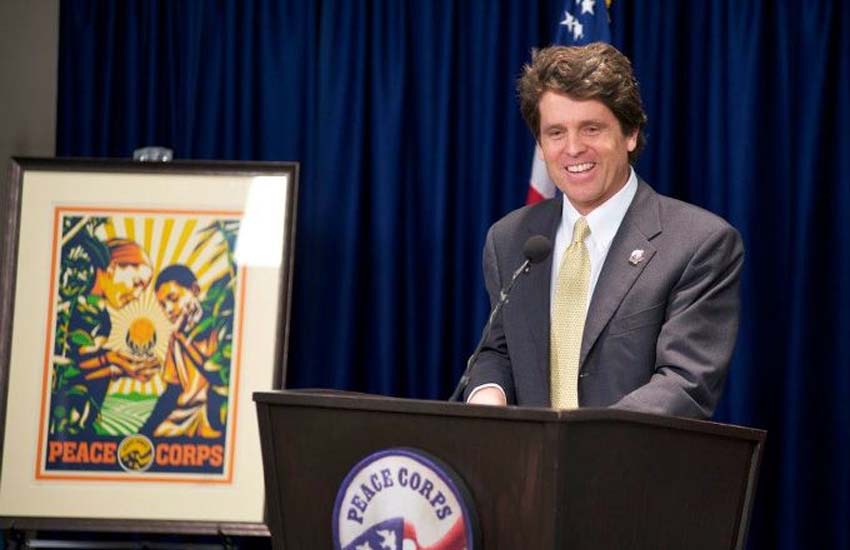
And lest you think that the events in Panama were an anomaly, in April 1965 the citizens of the Dominican Republic - the citizens of the same country Dave Meyercord served as a Peace Corps Volunteer some 25 years later - rose up and overthrew the military junta that had deposed the democratically elected government of Juan Bosch. Fighting broke out in the barrios of Santo Domingo between the rebels and the army, and President Lyndon B. Johnson - fearing that communists supported by Fidel Castro had inspired the uprising - sent 25,000 Marines to the country to restore order. At the time, there were 107 Peace Corps Volunteers serving in Santo Domingo and throughout the rest of the country. Again, the State Department urged that the Volunteers be evacuated, this time to Puerto Rico, with the rest of the Americans who were fleeing the country. What do you think my father did? He gave each Volunteer the choice to leave - or to stay with the people they had come to serve. What choice would you have made? What choice do you think the Volunteers made? Every one of the Peace Corps Volunteers decided to stay and continue to serve the people in their communities, all of whom were Constitutionalist rebels. The Volunteers worked in the hospitals tending the wounded. They distributed food supplies to the people trapped in the barrios by the Dominican army supported by the U.S. Marines. The rebel leader declared the Peace Corps Volunteers are "the only Americans welcome" in the Dominican Republic.
If they mean to have peace, let it begin here.
As I thought about those words, I thought that it was good and right to celebrate the last 50 years here today - a lot has been accomplished and we need to understand and, yes, celebrate those accomplishments.
But I also know that if my dad were here today, physically - because I feel him here spiritually - if he were here physically he would be agitating us all to think ahead, to the next 50 years.
He would challenge everyone in this room - from Director Williams to Donald Dell to the newest employee here - each one of us to do more for peace.
He'd ask us if we really believe in peace, why do we as a country spend less on the Peace Corps than we do on the marching band of the Army?
He would ask why we spend more in five hours in Iraq than we do on supporting the 8,700 Volunteers around the world for an entire year.
And he would - as he did to President Kennedy and Johnson and every leader he met - speak truth to power: he would know that during the 2008 election, President Obama campaigned on doubling the size of the Peace Corps. That is not even close to happening - indeed, there is a long waiting list of 20 new countries requesting Peace Corps programs.
Do we really mean to have peace? If so, why isn't it beginning here, in the United States?
Or are we just supporting the rhetoric and spending the money elsewhere?
Now these challenges, especially in tough economic times, might seem overwhelming, if not impossible, to overcome.
Right?
I mean, the President has so many other things on his mind, right? And they are all more important than the Peace Corps, correct?
Come on, now!
Think of what Dad overcame in 1961: we were right in the middle of the Cold War, Ike thought the idea was crazy, as did the Wall Street Journal, President Kennedy was focused on other, more important issues, other government entities didn't want the Peace Corps to be independent.
The Peace Corps had no structure.
There was no budget.
And the few supporters there were, wanted a small, pilot program. But that didn't deter Dad and his colleagues-they worked hard and smart and that's why we are here today in this auditorium!
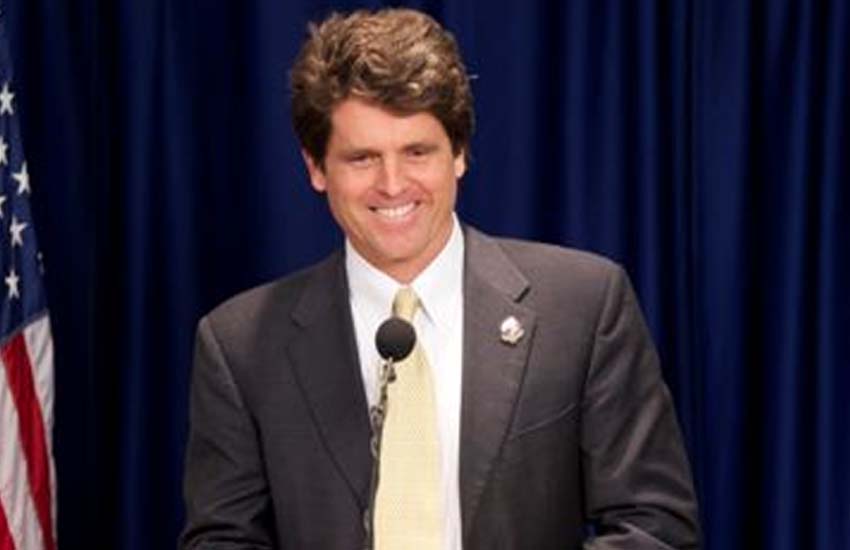
Let us today celebrate our first 50 years but let us recommit ourselves to the same spirit, the same fight that created the Peace Corps in the first place! Let me close by quoting my dad's speech at the 25th anniversary of the Peace Corps: "The Peace Corps seeks peace through service, not through economic strength or military power. Service is the heart and soul and substance of the Peace Corps. Service is a discredited word these days. Who wants to be a servant? No one! Service implies servitude, failure to achieve even equality, let alone dominion. Yet the Peace Corps exists to serve, to help, to care, for our fellow human beings. It works its magic from below, not from above. It concentrates on basics – food, health, education, community development. Peace Corps Volunteers are rarely in capital cities, rarely seen with gilded potentates. They are almost un-American in their willingness to serve in the boondocks. Peace Corps Volunteers come home realizing that there are billions of human beings not enraptured by our pretensions, or practices, or morals...billions of human beings with whom we must live in peace. PCV's learn that there's more to life than money, more to life than the latest styles in clothes, cars, or cosmetics.
"Suddenly I realize I do have a response to the original title given me for my speech. They asked me to talk about ‘the challenge of the Peace Corps.' The challenge is simple to express, difficult to fulfill: PCV's stay as you are...be servants of peace...work at home as you have worked abroad, humbly, persistently, intelligently. Weep with those who are sorrowful, rejoice with those who are joyful.
"Teach those who are ignorant. Care for those who are sick. Serve your wives...serve your husbands…serve your families...serve your neighbors...serve your cities...serve the poor. Join others who serve.
"Serve, Serve, Serve! That's the challenge.
"For in the end it will be the servants who save us all."
So to all of you here today, I ask: do you, really, mean to have peace?
If so, we have work to do! Let it begin now and let us go forth from this auditorium and let us all serve! Serve! Serve!
For in the end, my father was right, it will be the servants who save us all.
Thank you.








